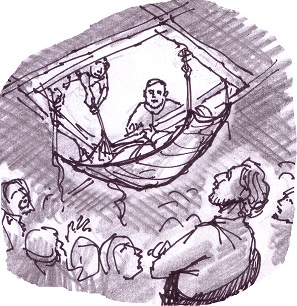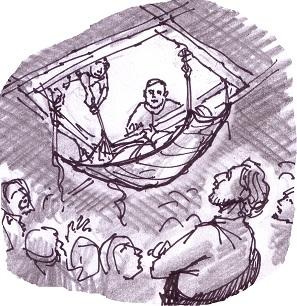

“We have never seen anything like this” (Mark 2:12).
1 Sam 8:4-7, 10-22a; Mark 2:1-12
Today’s first reading from the First Book of Samuel poses some interesting questions with relevance to what kind of government we want for ourselves today. Israel survived after it arrived in the land of Canaan as a loose federation of tribes kept together by chieftains called judges. But for military purposes as they fought to establish their presence among other competing groups in the land, the tribal elders came to Samuel, the high priest, to ask him to anoint a king. The benefits were evident. A single ruler would bring unity and military strength, and they would be a nation able to defeat their enemies and claim the land.
Samuel argued against this idea, first for theological reasons. Since God was their ruler, they existed in a kind of theocracy that combined religion and civil leadership. The Covenant and the Law of Moses were their de facto Constitution, a blueprint for a just and peaceful community that God would bless. When the elders insisted on a king, Samuel described the cost of such a ruler. They would be taxed, their sons drafted to form an army, their daughters to be servants, a whole society required to work to support a royal system under the authority of a single person. The price for having a strong ruler, an autocrat who would take care of everything, would be their freedom.
We do not need to look far into history to see such figures ruling with an iron hand and establishing dynasties to cling to power. They would do whatever was necessary to eliminate their opponents and suppress the popular will. Only a violent revolution could replace them, but with other tyrants or some attempt at self-rule. Autocrats arise when people fear chaos or changes that will affect their interests. They willingly give up control if a strong leader promises to make decisions for them to protect them from enemies and outsiders.
Because of his charismatic presence and power to heal and free people paralyzed by guilt and fear, Jesus was always seen as someone who could save his followers and provide everything they needed. After the miracle in today’s Gospel, people were in awe of Jesus and flocked to follow him. After the miraculous feedings in the wilderness, the crowds sought to make Jesus their king. Because of his messianic stature and popular support, those in power feared his influence and sought to subvert it and to destroy him.
Instead of seeking power, Jesus sought to empower others to experience the freedom and joy of servant leadership and sacrificial love. The reign of God he preached was about creating a beloved community of mercy and forgiveness. This “theocracy” would establish peace and provide for everyone in a society of abundance and generosity instead of scarcity and competition based on fear and greed.
Today’s Word stirs our imaginations with the choices before us, the work to be done, sacrifices to be made if we take up the challenge of Jesus. Love can raise the roof, heal paralysis, lighten the burdens of sin and enable us to pick up our lives and go forward.
Advertisement





